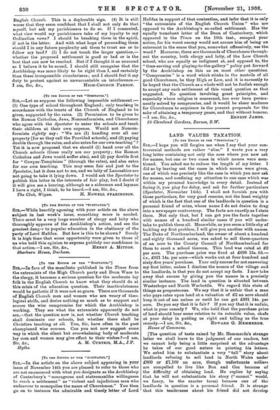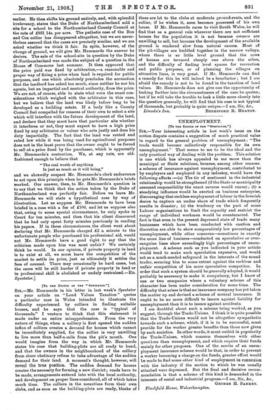LAND VALUES TAXATION.
[To THE EDITOR OF THY "SPECTATOR:1 Sin,—I hope you will forgive me when I say that your con- troversial methods are rather "slim." I wrote you a very long letter containing not only the case where you now ask for names, but one or two cases in which names were men- tioned. You asked me to reduce the length of my letter. I did so by leaving out the cases in which names were given, one of which was precisely like the case in which you now ask for names, and confining my attention to one case which was within my personal knowledge in every detail. Instead of facing it, you play for delay, and ask for further particulars (Spectator, November 14th). I Shall not furnish you with those particulars, for very good reasons, not the least weighty of which is the fact that one of the landlords in question is a personal friend of mine, whose name I do not desire to drag into a newspaper controversy. The facts are exactly as I state them. Not only that, but I can get you the facts together with names of a hundred similar cases if you will under- take to publish them all. Meanwhile, as you seem a little shy of tackling my first problem, I will give you another with names. The Duke of Northumberland, the owner of about a hundred and eighty thousand acres, was asked to sell three-quarters of an acre to the County Council of Northumberland for them to erect a school thereon. This land was rated at 22 per acre. The purchase price was fixed at 2698 15s. 6d.— i.e., 2931 14s. per acre—which works out at four hundred and sixty--five years' purchase. Your only excuse for not answering my first letter, unless I disclose the names of the village and the landlords, is that you do not accept my facts. I now take away that excuse by giving you the names in a precisely similar instance. The land in question is situated between Westerhope and North Warbottle. We regard this state of things as preposterous. We say that it is unfair that a man who pays rates upon land at a valuation of 22 an acre should keep it out of use unless or until he can get 2931 14s. per acre. Do you say that it is fair ? If you say that it is unfair, what is your remedy ? We, who hold that the purchase price of land should bear some relation to its rateable value, chafe at your delay in putting us right and telling us the true [The question of taste raised by. Mr. Hemmerde's strange letter we shall leave to the judgment of our readers, but we cannot help being a little surprised at the advantage he takes of our good nature in printing his letters. We asked him to substantiate a very "tall" story about landlords refusing to sell land in North Wales under £800 or £1,100 an acre, though unfortunate colliers are compelled to live like Box and Cox because of the difficulty of obtaining land. He replies by saying that be will not substantiate his story (" cannot" would, we fancy, be the exacter term) because one of the landlords in question is a personal friend. It is strange that this tenderness about his friend did not develop
earlier. He then shifts his ground entirely, and, with splendid irrelevancy, states that the Duke of Northumberland sold a site for a school to the Northumberland County Council at the rate of £931 14s. per acre. The pathetic case of the Box and Cox collier has disappeared altogether, but we are never- theless assured that the cases are precisely similar, and we are asked whether we think it fair. In spite, however, of the change of ground, we will give Mr. Hemmerde the answer he desires. The sale of the school-site in question by the Duke of Northumberland was made the subject of a question in the House df Commons last summer. It then appeared that the price paid was fixed by arbitration,—a reasonable and proper way of fixing a price when land is required for public purposes, and one which absolutely precludes the accusation that the landlord has asked too much, since neither he nor his agents, but an impartial and neutral authority, fixes the price. We are not, of course, able to state what were the exact con- siderations which weighed with the arbitrator in this case, but we believe that the land was likely before long to be developed as a building estate. If a body like a County Council feel compelled for reasons of their own to select a site which will interfere with the future development of the land, and declare that they must have that particular site whether it interferes or not, they must expect to have a high price fixed by any arbitrator or valuer who acts justly and does his duty impartially. The fact that the land was rented and rated low while it was being used for agricultural purposes does not in the least prove that the owner ought to be forced to sell at a price fixed by the purchaser, which is apparently Mr. Hemmerde's contention. We, at any rate, are old- fashioned enough to believe that "The real worth of anything Is just as much as it will bring," and we shrewdly suspect Mr. Hemmerde's clerk endeavours to act upon this principle when be gets Mr. Hemmerde's briefs marked. Our answer, then, to Mr. Hemmerde's question is to say that we think that the action taken by the Duke of Northumberland was perfectly fair. Before we leave Mr. Hemmerde we will state a hypothetical case by way of illustration. Let us suppose Mr. Hemmerde to have been briefed in a case with a fee of £100, and let us suppose also that, owing to some special circumstance, be only spoke in Court for ten minutes, and then that his client discovered that he had only spent forty minutes previously in reading his papers. If in these circumstances,the client went about declaring that Mr. Hemmerde charged L2 a minute to the unfortunate people who purchased his professional aid, would not Mr. Hemmerde have a good right to say that the criticism made upon him was most unfair ? We certainly think he would. In our opinion, if private property in land is to exist at all, we must leave the competition of the market to settle its price, just as ultimately it settles the fees of counsel. There may occasionally be hard cases, but the cases will be still harder if private property in land or in professional skill is abolished or unduly restrained.—ED. Spectator.]

































































 Previous page
Previous page